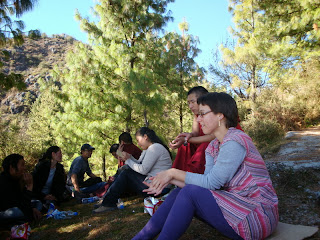This is it. I'm done teaching at Tibet Charity. Final exams were held yesterday; most of my students passed (a few of them have the extra credit to thank for that) and some did exceptionally well.
Today Gusti and I took them out for a pizza party in Dharamkot. The students brought some momos, we ordered ten delicious pizzas, and everyone had a lot of fun.
They kept telling me to sit down and relax, but I can't help it -- I enjoy entertaining and if I'm in anything resembling a hostess position, I tend to get into it. I asked them if they have winter holidays coming up in Tibetan/Bhutanese culture aside from New Year's. They said no, but asked about what we've got in the US. I told them all about Thanksgiving (Happy T-day to my friends in the States!), which most of them seemed quite interested in, and they asked all kinds of questions about turkeys. I don't think they have them here. I told them how most Americans prepare a big meal for this holiday so the fact that we were all out having food together was, in a way, quite similar. It's like they'd gotten together to make a Thanksgiving-away-from-home for me, and they seemed pleased that they could do this.
They insisted on doing everything. The students wouldn't let Gusti or me cut the pizzas, they wouldn't let us serve the food, and they always gave us the first slices when a fresh one would come out. Tibetans can be very bossy, but when it's in the context of such hospitality, how can you get upset?
After finishing our lunch and taking a bunch of photos on a dozen different cameras, phones, and tablets, they instructed us to follow them "up to the mountain." When I asked how far they answered "not far," but pointed to some indefinite area wayyyyyyyy off in the distance. I joked that it would take so long I'd miss my flight home. I hadn't worn the proper shoes for a real hike; I knew we'd be taking pictures so I opted to wear my red jutis that I got in Jaipur. People have been telling me they're more like house shoes. This bothered me at first, but then I remembered: I don't wear shoes in the house. If they're shoes, and I'm wearing them, it's going to be outside.
I pointed this out to them, that I wasn't wearing anything that could possibly pass for hiking shoes. Jampel, the one monk, told me "the Bhutan guys are very strong, they'll carry you!" to which the "Bhutan guys" responded that Tibetans were stronger (it's true, they tend to be tall and tough in general), but one way or another they'd get me where we were going.
 |
| This is Dolker. She's super sweet, and a pretty good student, too. |
 |
| The view just never gets old. |
Eventually we came to a Hindu shrine where we took some more photos and then backtracked just a little to a grassy spot where we could chill, sing songs, and munch on snacks for a while.
When we finally headed back down to McLeod Ganj, they insisted on taking a shortcut -- the same shortcut that Kalden, Brij, Marie, and I took when we went up to Triund that one time. At one point my foot slipped a bit and I heard a chorus of "Ohhh!" from the students who were in the lead and down below us. Lobsang Dolma, one of my quietest but most thorough students, insisted on holding my hand the rest of the way to make sure I didn't fall, even though she had also earlier insisted on carrying my bag as well as Gusti's, even though she already had her own. "Tibetans are very strong," I observed. They asked me if the roads were "like this" where I live; I told them no, only in the forests in some places. Generally they are in much better condition. They seemed to take this as a perfectly good explanation as to why they could navigate the rocky, irregular path so much more easily than us westerners.
Regardless, we made it down with no casualties. What we had originally planned to be a 3-hour event turned into one that lasted all morning and into the afternoon. It was fantastic. I love the comfort level that you reach with people after seeing them nearly every day for weeks or months, and when the official business or class or whatever is done, everyone can just relax and have a good time together. This evening we had our last staff/volunteer dinner at TC, tomorrow morning we have our closing ceremony for the semester, for which I still have to put together a speech of some sort, and after that.... we're all done. I just have to tie up my loose ends around town as far as last-minute gift obtainment, pay my bill at the hotel, eat at my favorite restaurants once or twice more, pack up all of my stuff -- and decide what's not coming back with me -- and that's it. Get on a night bus to Delhi next Tuesday or Wednesday evening, make sure I tell my students ahead of time because I know at least a couple will want to see me off, and go. Exactly one week from this very moment I'll be somewhere in Indira Gandhi International Airport, maybe waiting to go through security, maybe chilling at my gate with a book, but I'll be having my final few hours in India.
Four months sure flies when you're having fun. I knew it would.
Where should I go for my next trip? I've got a couple of places in mind, but I'm interested to see what kind of input I can get from my dear readers......


